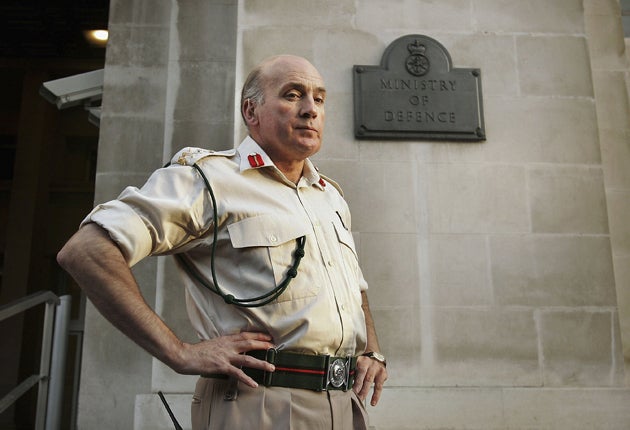An unpleasant skirmish at the ministry
Who has been smearing General Sir Richard Dannatt? The obvious candidate denies it – but the whispering goes on

Your support helps us to tell the story
From reproductive rights to climate change to Big Tech, The Independent is on the ground when the story is developing. Whether it's investigating the financials of Elon Musk's pro-Trump PAC or producing our latest documentary, 'The A Word', which shines a light on the American women fighting for reproductive rights, we know how important it is to parse out the facts from the messaging.
At such a critical moment in US history, we need reporters on the ground. Your donation allows us to keep sending journalists to speak to both sides of the story.
The Independent is trusted by Americans across the entire political spectrum. And unlike many other quality news outlets, we choose not to lock Americans out of our reporting and analysis with paywalls. We believe quality journalism should be available to everyone, paid for by those who can afford it.
Your support makes all the difference.It was the week when the death toll among British forces serving in Afghanistan surged beyond 200, and the world watched as the war-torn nation made its latest, faltering steps towards democracy.
The thousands of British troops charged with maintaining security looked on as millions of Afghanis prepared for the perilous task of voting in their country's second democratic presidential election since the Taliban were ousted in 2003.
But, back home, their masters were occupied by other matters.
On the day that the widow of a soldier killed in Afghanistan was presented with the first Elizabeth Cross, it emerged that tensions between politicians and the military in the Ministry of Defence had reached a new high. And the issue in question was nothing to do with the mission for which thousands of UK personnel were risking their lives.
An unnamed defence minister was accused of plotting a "smear campaign" against the country's most senior soldier days before he retires. The "shameful plot", we were told, had been hatched because General Sir Richard Dannatt had been outspoken in his criticism of the politicians' failure to supply vital equipment, notably helicopters, to front-line troops.
The weapons used against the outgoing Chief of General Staff were a series of freedom of information requests, designed to tease out the general's entertainment budget – thus tarnishing the reputation of this "army legend".
There are six ministers at the MoD, but it did not take long for the prime suspect to emerge. Kevan Jones is a Gordon Brown loyalist who has forged a reputation as a robust character around Parliament since he was elected in 2001. During an earlier career as a blunt member of Newcastle City Council, he boasted of regularly "kebabing" officials in public during their attempts to explain their actions before him. It was a fearsome habit displayed regularly in public hearings after the North West Durham MP was elected to the Defence Select Committee.
Mr Jones has clearly carried this fierce refusal to be cowed by reputations into the MoD, where he has been required to deal with some of the finest military minds in the land.
Significantly, his own reputation preceded him when he arrived at the department last year. In the months before his promotion, Mr Jones had asked more than 50 parliamentary questions that revealed embarrassing details about the spending of the most senior officers who sit on the Army Board: the makeovers at their official residences, the domestic staff, the tennis courts, the ride-on lawnmowers.
There was suspicion, if not outright hostility, about his motives when he took his seat at the MoD; many officials claim his subsequent behaviour has proved the Worksop comprehensive schoolboy is no friend of the officer class. When Bob Ainsworth, Secretary of State for Defence, ordered his team not to criticise General Sir Richard earlier this year, it was assumed that Mr Jones was his real target.
For his part, the minister responded not simply by denying the allegations, but by praising the general. Mr Jones, who maintained that he had worked "very closely" with General Sir Richard, said: "I look forward to continuing our working relationship."
Behind the scenes, the response of the political side was less conciliatory. One senior source chose to reinforce question marks over the general – and widen the attack. General Sir Richard was unpopular, he said, with counterparts from the other services and he had crossed swords with other ministers. Moreover, the source claimed, a number of the offending freedom of information requests had probably emanated from elsewhere within the MoD: "These inquiries have nothing to do with Kevan," he said. "I think people should be looking at others."
It is hardly likely to improve critical relationships at a uniquely difficult time for the MoD. General Sir Richard has been regarded by politicians as difficult to read because of his quiet demeanour, his deep religious faith and his willingness to give a brutally honest answer to questions about provision for the forces. He is, however, widely respected for that honesty, as well as for a military career that has spanned almost four decades.
"They are not going to win any sort of battle with someone like Richard," a fellow general observed last night. "He isn't the type to get involved in a slanging match and, in any case, it's impossible to believe he has done anything untoward."
Mr Jones may believe that the story is the product of a slow summer, but the outraged response shows that criticising a respected military man – and reinforcing the view that New Labour is still addicted to spin tactics – are dangerous pursuits. Unity in the face of adversity is a basic requirement at the MoD, but an ability to recognise the real challenges facing UK forces would help.
Join our commenting forum
Join thought-provoking conversations, follow other Independent readers and see their replies
Comments